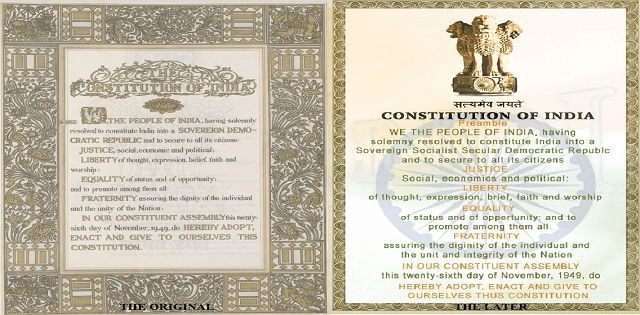Class 8 Civics Chapter 1 Important Question Answers - The Indian Constitution
Ques 1: In politics, what is a constitution?
Ans: In Politics a Constitution can be described as a document outlining the basic laws or principles by which a country is to be governed.
Ques 2: Write a brief note on the making of the Indian Constitution.
Ans: The Indian Constitutional Assembly was convened in December 1946. The members of this Assembly were only Indians. This Assembly started drafting the Constitution for Independent India. Dr. Ambedkar was the Chairman of the Constitution drafting committee.
The constitution declares India to be a sovereign, democratic republic and establishes the structure, procedures, powers and duties, of the government and duties of citizens.
The 308 members of the Assembly signed two hand-written copies of the document (one each in Hindi and English) on the January 24, 1950. Two days later, on January 26, 1950, the Constitution of India became the law of all the Indian lands.
 Indian Constitution
Indian Constitution
Ques 3: In Nepal, when did the Interim Constitution come into effect?
Ans: In Nepal, the Interim Constitution came into effect from January 15, 2007.
Ques 4: Write a brief note on the struggle for freedom in Nepal.
Ans: In Nepal, there was a people’s struggle for freedom in 1990. Democracy was established and it lasted for 12 years until 2002.
In October 2002, King Gyanendra began taking over the government with the assistance of the army. In 2005 King Gyanendra took over as the head of the government.
In 2006, people’s movement for democracy began gaining immense force. In April 2006 the King restored the Third Parliament and asked the political parties to form a government. In 2007, Nepal adopted an Interim Constitution and Nepal gained political freedom.
Ques 5: What are the negative points of a democratic society?
Ans: In a democratic society Power can be misused. Sometimes the Majority can undermine minority. The citizens need certain rules to save themselves from folly.
Ques 6: How can a leader misuse power in a democratic country?
Ans: A leader misusing his power may send his security guards to beat up his neighbours for a personal reason or ask the police not to take action against a relative who has committed a crime.
Ques 7: How does the Indian Constitution safe guard the minorities of the country?
Ans: The Indian constitution ensures that the dominant group does not use its power against other, less powerful people or groups.
The Constitution contains rules that ensure that minorities are not excluded from anything that is routinely available to the majority. It also prevents the domination of the majority over the minority.
Ques 8: Mention the key features of the Indian Constitution.
Ans: The key features of the Indian constitution are:-
- Federalism
- Parliamentary Form of Government
- Separation of Powers
- Fundamental Rights
- Secularism
Ques 9: What are the factors the drafting committee had to take into consideration while drafting the constitution?
Ans: The committee had to keep in mind that India was a land of many communities, languages and many religions. India was a land of diverse cultures and the Princely states in India had to be considered. The partition of the country into India and Pakistan was about to happen and the drafting committee had to bear this in mind. Finally the biggest consideration was the socio-economic condition of a majority of Indians which was in a bad state.
Ques 10: What were the highlights of the text prepared by Dr. B.R. Ambedkar, who was the Chairman of the constitution drafting committee?
Ans: Highlights of the Text prepared by Dr. Ambedkar are:-
Constitutional guarantees and protections for individual citizens
Freedom of religion
Abolition of untouchability
Outlawing of all forms of discrimination
Economic and social rights for women
Reservations of jobs in the civil services, schools and colleges for members of scheduled castes and scheduled tribes.
Ques 11: What is universal adult franchise?
Ans: Universal adult franchise is every adult citizen having a right to vote irrespective of sex, caste, creed, education and financial status.
Ques 12: What do you mean by the legislature, the executive and the judiciary?
Ans: The legislature refers to our elected representatives.
The executive is a smaller group of people who are responsible for implementing laws and running the government.
The judiciary refers to the system of courts in this country.
Ques 13: What are the key components of fundamental rights?
Ans: The key components of Fundamental rights are:-
- Right to Equality
- Right to Freedom
- Right against Exploitation
- Right to Freedom of Religion
- Cultural and Educational Rights
- Right to Constitutional Remedies
Ques 14: What is secularism?
Ans: Secularism is the right of the citizens to practice any religion. A secular state is one in which the state does not officially promote any one religion as the state religion.
|
70 videos|560 docs|46 tests
|
FAQs on Class 8 Civics Chapter 1 Important Question Answers - The Indian Constitution
| 1. What is the Indian Constitution? |  |
| 2. Who drafted the Indian Constitution? |  |
| 3. What are the salient features of the Indian Constitution? |  |
| 4. How can the Indian Constitution be amended? |  |
| 5. What is the significance of the Indian Constitution? |  |

















